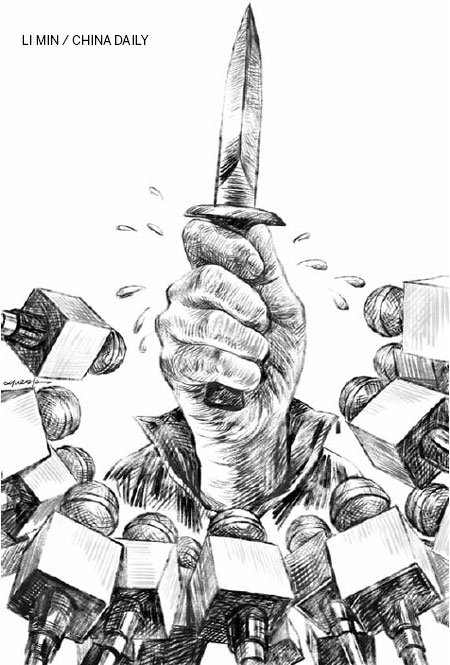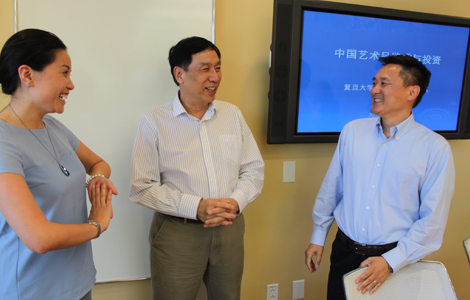The role of media vis-a-vis crimes
Updated: 2013-08-05 07:03
By Patrick Mattimore (China Daily)
|
||||||||

The recent spate of stabbings in China raises an interesting psychological question and media dilemma quite apart from the tragic events themselves. Has detailed media exposure of the crimes exacerbated the problem, resulting in copycat acts, thereby further disturbing social security? If so, does the media have a responsibility to report such incidents in a manner that mitigates the likelihood of the acts being repeated?
Before attempting to address the questions, there is an important caveat to consider: Have stabbings actually increased in China in recent weeks? That seems to have a self-evident answer, because the stabbings have been more in the news. But without a statistical breakdown, it is impossible to know whether stabbings or merely reports on them have increased.
For example, three years ago the media reported that there was an "epidemic" of suicides at the electronic company Foxconn. For months, the press reported each of the gruesome suicides in detail. A host of news reports appeared to suggest that the company was at fault and needed to change its policies. It turned out, however, that Foxconn's suicide rate during that particular reporting cycle was actually lower than China's national average based on the number of employees working at Foxconn.
If, after a thorough investigation, journalists discover that the stabbings in recent weeks have increased, then psychology may have a few answers as to why. But even those answers should be taken with a grain of salt, since it is always easier to offer ex post facto explanations for phenomenon than to predict future behaviors or events.
While it is not altogether clear why an individual will imitate another's criminal behavior, it is a well-established psychological principle that we do model our behavior according to what we see others doing.
Beginning with an ingenious experiment in 1961, Stanford University psychologist Albert Bandura helped social learning theorists recognize that individuals can learn merely by observing the behaviors of others.
In Bandura's Bobo doll experiment, children watched a television monitor in which adults punched and kicked a 5-foot plastic blow-up doll. When the children subsequently were in a room with the Bobo doll, they imitated the adults' aggressive behavior, thus providing evidence that learning occurs through modeling. Bandura also found that children who were not exposed to the aggressive model were unlikely to behave aggressively.
Similarly, the massive wave of emulation (copycat) suicides after a widely publicized suicide is known as the Werther effect, following Johann Wolfgang von Goethe's novel The Sorrows of Young Werther. The novel, in which the hero kills himself, was banned in some European countries after its publication more than 200 years ago because of a rash of suicides by young men who had read it.
While copycat suicides are not as common as feared, the existence of suicide clusters has been confirmed by studies launched by the Center for Disease Control and Prevention in Atlanta, Georgia, in the US.
But knowing that publication of anti-social events such as mass stabbings, airport bombings or celebrity suicides, compounds the problem, begs the question as to how the media should handle such events. Should the media turn a blind eye or attempt to put a positive spin on bad news?
There is a strong psychological argument why media should temper the reporting of negative events. "Negativity bias" is the phenomenon by which humans pay more attention to and give more weight to negative rather than positive experiences or other kinds of information.
Roy F. Baumeister, a professor of social psychology at Florida State University, co-authored the idea of the negativity bias in a literature review in 2001 entitled, "Bad is stronger than good". This review went through a whole gamut of psychological contexts from first impressions, close relationships, memory, self-identity and more, where a negative bias was apparent.
Baumeister and his co-authors provide fascinating and very convincing evidence from different fields of studies and research that people perceive negative experiences much more intensely than positive experiences. The effect of these negative experiences also seems to have a greater impact and to last longer than the effect of positive ones.
There is, however, a countervailing argument as to why the media must report negative events. It is, quite simply, that transparency builds trust. Psychology aside, if people believe that the media are hiding unpleasant truths or attempting to sugarcoat them, people will be less inclined to believe the media.
The media's job is not to psychologically filter out facts to make press reports more palatable, but to determine what facts are most important for the public to know.
In the final analysis, although psychology may suggest reasons we should not hear or read about negative events, knowing that we are being told the truth is the greatest service the media can provide.
The author taught psychology for many years and is a fellow at the Institute for Analytic Journalism.
(China Daily USA 08/05/2013 page12)

 British couple caring for special children
British couple caring for special children
 Fly for adventure at US air show
Fly for adventure at US air show
 Kobe Byrant meets fans in Shenzhen
Kobe Byrant meets fans in Shenzhen
 New Zealand milk stokes fears
New Zealand milk stokes fears
 Yemen enhances security over embassies
Yemen enhances security over embassies
 Chinese heavy ground combat vehicles join drill
Chinese heavy ground combat vehicles join drill
 Police find kidnapped baby alive in Henan
Police find kidnapped baby alive in Henan
 Privacy 'needed' for young offenders
Privacy 'needed' for young offenders
Most Viewed
Editor's Picks

|

|

|

|

|

|
Today's Top News
Pessimists ignoring China's strengths may lose out
Overseas investors welcome to bid in Beijing
US extends closure of embassies
New Zealand milk stokes fears
Riding the clean energy boom today
Magnetic attraction for EU SMEs
Mugabe wins Zimbabwe presidential election
EU solar deal hailed as blueprint
US Weekly

|

|





